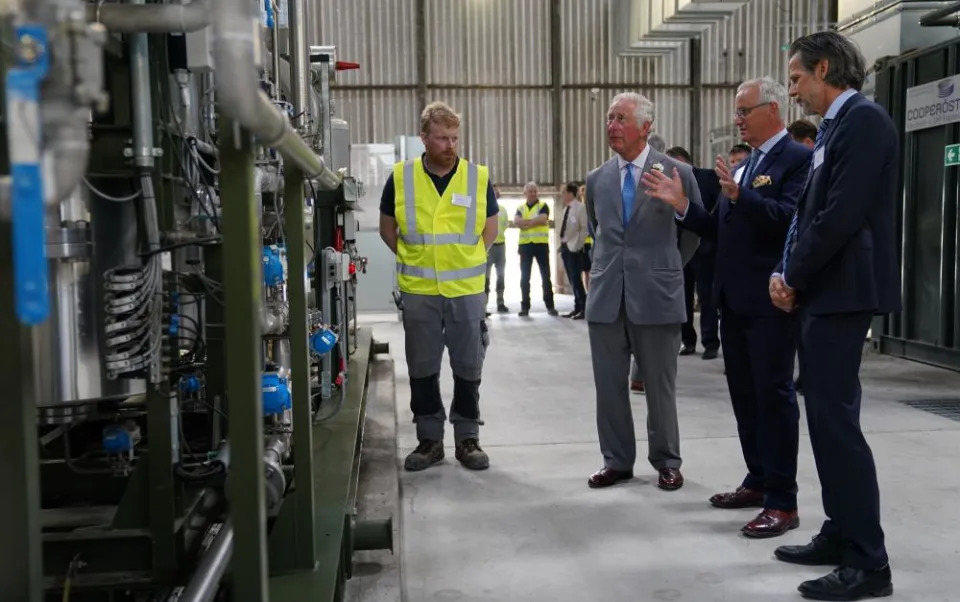Severin Carrell
Sun, 9 April 2023
A green energy company set up by King Charles was investigated for numerous health and safety breaches after the unauthorised leak of more than 1,000 tonnes of global-heating gases.
Methane, CO2 and traces of the toxic gas hydrogen sulphide were released after a gas-holder at the plant split open in 2020. The incident, which lasted for 38 days, was described as “significant” by the Environment Agency.
The plant in Dorset, JV Energen, was also investigated for breaches involving “flammable and toxic” substances. It is majority-owned by the Duchy of Cornwall, a hereditary estate that raises revenues for whoever is the male heir to the throne.
The duchy said in a statement: “The negative impact of the emissions associated with the leak, while regrettable, were completely immaterial compared with the positive impact of the provision of renewable energy.”
The plant is at Rainbarrow Farm, near Dorchester, on land belonging to the Duchy of Cornwall. Now owned by Prince William by right of his title of Duke of Cornwall, the duchy estate had for decades been overseen by his father.
Cost of the crown is an investigation into royal wealth and finances. The series, published ahead of the coronation of King Charles III, is seeking to overcome centuries of secrecy to better understand how the royal family is funded, the extent to which individual members have profited from their public roles, and the dubious origins of some of their wealth. The Guardian believes it is in the public interest to clarify what can legitimately be called private wealth, what belongs to the British people, and what, as so often is the case, straddles the two.
• Read more about the investigation
JV Energen was opened in 2012 and hailed by Charles as a breakthrough in green energy production. It is a joint venture between four farmers and the duchy. The plant turns crops into gas and electricity, which are used in the local area, as well as to create fertilisers for local farms.
Related: Revealed: royals took more than £1bn income from controversial estates
The Health and Safety Executive investigated the plant after the 2020 leak and issued a series of improvement notices under health and safety legislation, dangerous and explosive substances regulations and worker safety rules.
In December 2020, the HSE’s inspection found JV Energen had failed to protect its employees by neglecting to make a “suitable and sufficient assessment [of the] risks of fire, explosion, asphyxiation, toxic releases and potential over-pressurisation of work equipment” at Rainbarrow Farm.

Charles on a visit to Rainbarrow Farm in June 2021.
Photograph: WPA/Getty Images
Its follow-up investigations uncovered other safety breaches, including the unsafe use and storage of propane gas, failures to prevent “flammable atmosphere formation” at the site, and a failure to test ventilation equipment that protects staff from exposure to potentially toxic ammonia.
The investigations concluded in August last year. The requirements of the final improvement notices were met the following month but the plant is still being monitored “to ensure sustained compliance” with those notices, the agency said.
As a producer of green energy, the plant has been eligible for significant government subsidies. These are worth more than £4m a year to JV Energen. Since its launch in 2012, the company has received more than £28m in state subsidies, according to data analysed by the Guardian.
In addition to the four improvement notices issued over the gas leak, there have been numerous warning notices and improvement requests made by the Environment Agency after other incidents.
Official records seen by the Guardian show these incidents included a major leak in January 2015 of tonnes of liquid and solid “digestate”, a byproduct from gas production used as a fertiliser, which flooded farmland and a nearby road. The following month, a tanker carrying the same type of fluid overturned at a roundabout near JV Energen’s site.
JV Energen is legally controlled by the Duke of Cornwall. Until he became king and passed the duchy to his male heir, Charles was named in the company’s records as the person with significant control.
The duchy receives a 59% share of JV Energen profits and has received more than £1m in rent from the company for using the duchy land it is built on. The duchy has been paid a further £6m in interest from a series of loans it has provided to JV Energen.
Last year, the duchy said the business, which also sells carbon dioxide to drinks firms, was the most profitable of the joint ventures it had with other business partners. Its accounts suggest it made about £4m profit for the duchy in 2022, a significant contribution to revenues that were used to pay the male heir to the throne more than £20m. Buckingham Palace insists such income is “private”.
Its follow-up investigations uncovered other safety breaches, including the unsafe use and storage of propane gas, failures to prevent “flammable atmosphere formation” at the site, and a failure to test ventilation equipment that protects staff from exposure to potentially toxic ammonia.
The investigations concluded in August last year. The requirements of the final improvement notices were met the following month but the plant is still being monitored “to ensure sustained compliance” with those notices, the agency said.
As a producer of green energy, the plant has been eligible for significant government subsidies. These are worth more than £4m a year to JV Energen. Since its launch in 2012, the company has received more than £28m in state subsidies, according to data analysed by the Guardian.
In addition to the four improvement notices issued over the gas leak, there have been numerous warning notices and improvement requests made by the Environment Agency after other incidents.
Official records seen by the Guardian show these incidents included a major leak in January 2015 of tonnes of liquid and solid “digestate”, a byproduct from gas production used as a fertiliser, which flooded farmland and a nearby road. The following month, a tanker carrying the same type of fluid overturned at a roundabout near JV Energen’s site.
JV Energen is legally controlled by the Duke of Cornwall. Until he became king and passed the duchy to his male heir, Charles was named in the company’s records as the person with significant control.
The duchy receives a 59% share of JV Energen profits and has received more than £1m in rent from the company for using the duchy land it is built on. The duchy has been paid a further £6m in interest from a series of loans it has provided to JV Energen.
Last year, the duchy said the business, which also sells carbon dioxide to drinks firms, was the most profitable of the joint ventures it had with other business partners. Its accounts suggest it made about £4m profit for the duchy in 2022, a significant contribution to revenues that were used to pay the male heir to the throne more than £20m. Buckingham Palace insists such income is “private”.

JV Energen was hailed by Charles after its opening as a breakthrough in green energy production. Photograph: WPA/Getty Images
The gas leak in 2020 led to a series of disputes between the Environment Agency and JV Energen over the factual accuracy of the company’s estimates of how much gas had leaked, and how to measure its global-heating effects.
The agency disputed calculations by consultants for JV Energy who said the overall greenhouse effect of the leak was equivalent to just over 1,000 tonnes of CO2. An agency official said he believed it was at least double that.
When contacted by the Guardian, JV Energen referred requests to comment to the Duchy of Cornwall.
The duchy said in its statement that it was “a responsible landowner committed to sustainability and continues to invest in renewable energy and reduce the estate’s carbon footprint”.
It said: “The anaerobic digester and biomethane-to-grid plant … was the first of its kind in the UK, providing renewable energy direct to the local community and across Dorset. It continues to work with all regulators and bodies to ensure it meets all rules and regulations in this space.”
No comments:
Post a Comment